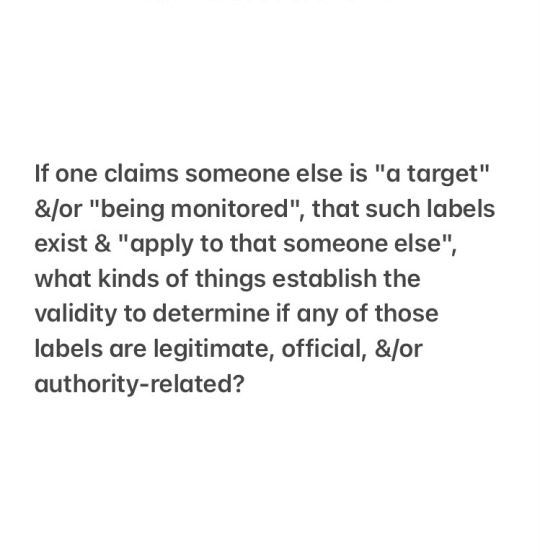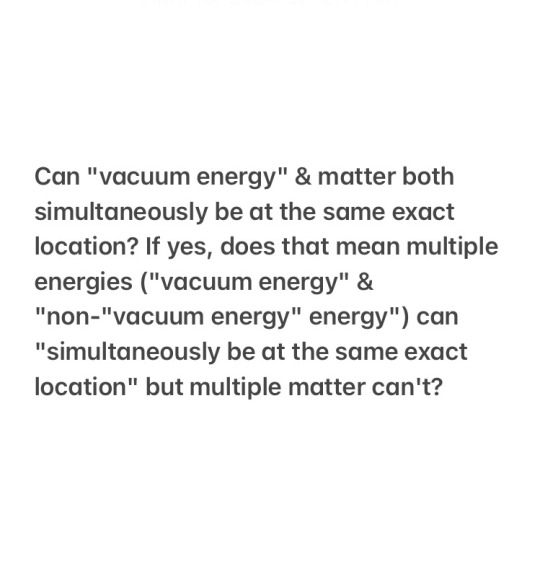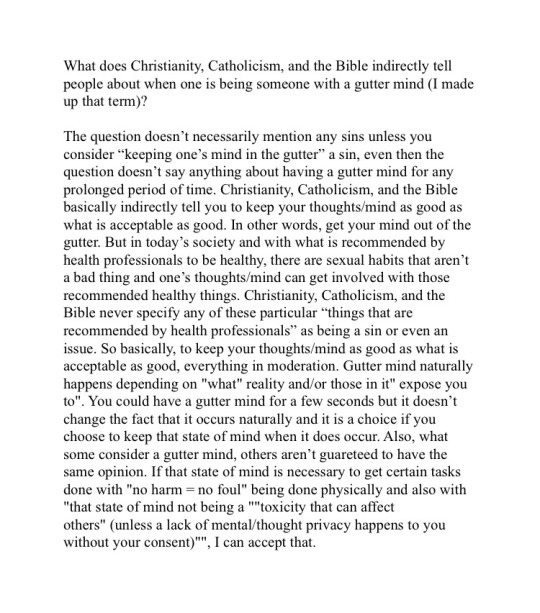Text
If one claims someone else is "a target" &/or "being monitored", that such labels exist & "apply to that someone else", what kinds of things establish the validity to determine if any of those labels are legitimate, official, &/or authority-related?

0 notes
Text
What is a good non-mathematics example for the common expression "that don't add up" (for when a person is told something but the knowledge/beliefs that the person "had and is still aware of" conflicts with "that something that the person is told")?

0 notes
Text
Can "vacuum energy" & matter both simultaneously be at the same exact location? If yes, does that mean multiple energies ("vacuum energy" & "non-"vacuum energy" energy") can "simultaneously be at the same exact location" but multiple matter can't?

0 notes
Text
What is in between "vacuum energy" and "non-"vacuum energy" energy"? What keeps ""vacuum energy" and "non-"vacuum energy" energy"" separated?

0 notes
Text
To me, an AI's "binary/trinary/qubits code" is that AI's soul, so to speak. Is it possible that someone can create a "computer virus" that can attack/erase all of a "computer's/AI's ""binary/trinary/qubits code" & ""Boot media" program(s)"""?
If such a computer virus is able to be created, it "is or would be useful" in military warfare, but problematic in the wrong hands. For example, in the wrong hands, someone could make someone else's Tesla car stranded, leaving the "Tesla car and its owner" stranded. The owner might find a means to no longer be stranded but I don't know "what would happen regarding that Tesla car".
There have been multiple versions of ROM (Read-only Memory) over the years.
The original type of ROM had the memory contents physically encoded directly in the circuit architecture at the time of fabrication. This type of ROM can't be rewritten.
The next type of ROM was PROM (Programmable ROM) which can be written EXACTLY once by using high voltage to burn out parts of the circuit to encode the contents in the architecture of the circuit.
Then came EPROM, which was kind of like PROM, except you could reset the entire memory chip by exposing the chip to strong ultraviolet light, and then rewrite it from scratch.
Then came EEPROM, which allows reset and rewrite of individual pieces of the memory. Flash memory is a type of EEPROM. It is not really "read only memory" at all, because it is possible to repeatedly rewrite it, although in practice it is often used in systems that do not have the capability to rewrite it, either because rewriting is not implemented in the hardware or software. It can be written to, and then erased but does not need current to keep the data, which means when you shut your computer off, EEPROM keeps the information unlike RAM. So why not always use EEPROM? Because it's much much MUCH slower than RAM.
REALLY, at this point, the difference between RAM and ROM is that RAM is volatile and ROM is persistent - when you turn the computer off, all the data stored in RAM disappears, but the data stored in ROM doesn't.
Is it 100% impossible to write to read only memory? Could a hacker, for example, put a virus to a "read only factory reboot partition" of your hard drive?
So no, it isn't 100% impossible to write to read only memory, depending on the type of read only memory.
The "read only factory reboot partition" of a hard drive isn't even ROM, though. It's just normal space on the hard drive that is tagged "gee, you really shouldn't write anything here, because this is important," and most computer programs respect those tags and won't write to that data. If you have a piece of software that doesn't care about the read-only tags, then it will be perfectly happy to do anything you want to that partition.
As far as viruses through actual ROM devices, there was a pretty big uproar a while ago because someone figured out how to propagate viruses through the firmware chips (which are ROM) of USB devices and controllers. As far as I know, there aren't any real viruses in the wild using this method, but also as far as I know, the vulnerability hasn't been fixed.
0 notes
Text
Is "ROM's ("Read-only memory"'s) "embedded code"" "physical or digital"? If digital, "how is digital code, even if it's "embedded code"", ""absolutely impossible to erase" except via" solely "physical destruction" to the chip/etc containing the code?
There have been multiple versions of ROM over the years.
The original type of ROM had the memory contents physically encoded directly in the circuit architecture at the time of fabrication. This type of ROM can't be rewritten.
The next type of ROM was PROM (Programmable ROM) which can be written EXACTLY once by using high voltage to burn out parts of the circuit to encode the contents in the architecture of the circuit.
Then came EPROM, which was kind of like PROM, except you could reset the entire memory chip by exposing the chip to strong ultraviolet light, and then rewrite it from scratch.
Then came EEPROM, which allows reset and rewrite of individual pieces of the memory. Flash memory is a type of EEPROM. It is not really "read only memory" at all, because it is possible to repeatedly rewrite it, although in practice it is often used in systems that do not have the capability to rewrite it, either because rewriting is not implemented in the hardware or software. It can be written to, and then erased but does not need current to keep the data, which means when you shut your computer off, EEPROM keeps the information unlike RAM. So why not always use EEPROM? Because it's much much MUCH slower than RAM.
REALLY, at this point, the difference between RAM and ROM is that RAM is volatile and ROM is persistent - when you turn the computer off, all the data stored in RAM disappears, but the data stored in ROM doesn't.
Is it 100% impossible to write to read only memory? Could a hacker, for example, put a virus to a "read only factory reboot partition" of your hard drive?
So no, it isn't 100% impossible to write to read only memory, depending on the type of read only memory.
The "read only factory reboot partition" of a hard drive isn't even ROM, though. It's just normal space on the hard drive that is tagged "gee, you really shouldn't write anything here, because this is important," and most computer programs respect those tags and won't write to that data. If you have a piece of software that doesn't care about the read-only tags, then it will be perfectly happy to do anything you want to that partition.
As far as viruses through actual ROM devices, there was a pretty big uproar a while ago because someone figured out how to propagate viruses through the firmware chips (which are ROM) of USB devices and controllers. As far as I know, there aren't any real viruses in the wild using this method, but also as far as I know, the vulnerability hasn't been fixed.
"All things that are digital" are physical since the data and signals are physically in/on something physical and if that something physical gets entirely destroyed, all things digital in/on it get entirely destroyed with it.
0 notes
Text
What "binary/trinary/qubits code patterns" do all computers have in common and for what purposes are those particular "binary/trinary/qubits code patterns" for?
0 notes
Text
Will a feature whereby generative AI ""scans/analyzes an uploaded 100-pages-worth-of-text file "online or via a generative AI App"" & generates an at least 5 minute long video that's in accordance with what the text file's text paints" launch soon?
I've heard of the generative AI called Sora, which is extremely new, and can generate videos based on a few sentences that a person types up,… but I haven't yet heard of a generative AI that can generate videos based on a one-shot 100-pages-worth-of-text file. If the generative AI called "Sora" ever becomes able to do that, plenty of books can simply be scanned/analyzed by "Sora" and have generated videos made that are in accordance with the "world and/or story" of those books. Would be awesome, but I've never seen it done by any AI yet.
https://www.wired.com/story/openai-sora-generative-ai-video/
0 notes
Text
The Bible's Matthew 12:37 & Psalm 51:4 show logic/concept of "justified" existing even during Biblical times. Do those verses imply that, to be worthy, "one's words must justify one's "actions" &/or "way one lived," thereby determining if one is worthy?

0 notes
Text
Does the following mean that we should, to get accepted as "Sanctified", discard all of our "concepts and originations" that reference anything pertaining to "the world we lived in and our experiences that we had in that world" because such references refer to that which, despite the good aspects that can be referred to, contains ugliness/non-good thereby rendering such references unacceptable by the standards/requirements for one to be "Sanctified"? :
Sanctification also means dedication, consecration and set apart for God’s use. This work of grace makes one not to commit sin. Whosoever is born of God doth not commit sin; for his seed remaineth in him: and he cannot sin, because he is born of God (1 John 3:9). When the heart is pure, the mouth will produce clean words. The eye will love to see undefiled things. The ear will also love to hear gracious words and detest sinful acts like worldly music and the rest. Sanctification is holiness.

0 notes
Text
I believe that each human, themself, generates all of their own thoughts. Do you believe that such is so, or "that all thoughts come from one same non-human source & that all thoughts already existed before any human thought any of those thoughts"?
It is estimated that the human brain has close to 100 billion neurons. Neurons release brain chemicals, known as neurotransmitters, which generate these electrical signals in neighboring neurons. The electrical signals propagate like a wave to thousands of neurons, which leads to thought formation. Due to that, "I too" I believe that each human, themself, generates all of their own thoughts.

0 notes
Text
Regarding "what a person's "flow" is" when it comes to music, is "flow" "the ""voice or verbal" delivery style" performed in accordance with a rhythm/beat"?

0 notes
Text
If you're not disrespecting, then you're showing respect. If you lack respect, you're disrespecting. Is there an alternative status such as "neutral" whereby you don't respect someone but you don't go out of your way to interfere in their matters?
I agree with this answer that someone else wrote on Quora:
Yes, there is an alternative status of neutrality where you neither show respect nor disrespect towards someone. Being neutral means that you do not have any particular bias towards a person or their actions, and you do not go out of your way to interfere in their matters.
Being neutral does not necessarily mean that you are indifferent or apathetic towards someone. It simply means that you are not showing any overt signs of respect or disrespect, and you are allowing them to carry out their actions without any interference from you.
It is important to note that being neutral does not mean that you are absolved of any responsibility towards others. In situations where your actions or inactions could have an impact on others, it is important to consider the potential consequences of remaining neutral and whether it would be more ethical or responsible to take a more active role.

0 notes
Text
What are all the different labels that you’ve ever heard of a person’s style (not fighting style) being labeled? Also, have you ever heard of a person’s swag being labeled something?

0 notes
Text
What does Christianity, Catholicism, and the Bible indirectly tell people about when one is being someone with a gutter mind (I made up that term)?
The question doesn’t necessarily mention any sins unless you consider “keeping one’s mind in the gutter” a sin, even then the question doesn’t say anything about having a gutter mind for any prolonged period of time. Christianity, Catholicism, and the Bible basically indirectly tell you to keep your thoughts/mind as good as what is acceptable as good. In other words, get your mind out of the gutter. But in today’s society and with what is recommended by health professionals to be healthy, there are sexual habits that aren’t a bad thing and one’s thoughts/mind can get involved with those recommended healthy things. Christianity, Catholicism, and the Bible never specify any of these particular “things that are recommended by health professionals” as being a sin or even an issue. So basically, to keep your thoughts/mind as good as what is acceptable as good, everything in moderation. Gutter mind naturally happens depending on "what" reality and/or those in it" expose you to". You could have a gutter mind for a few seconds but it doesn’t change the fact that it occurs naturally and it is a choice if you choose to keep that state of mind when it does occur. Also, what some consider a gutter mind, others aren’t guareteed to have the same opinion. If that state of mind is necessary to get certain tasks done with "no harm = no foul" being done physically and also with "that state of mind not being a ""toxicity that can affect others" (unless a lack of mental/thought privacy happens to you without your consent)"", I can accept that.

0 notes
Text
How "closely related" are "knowledge and information"? Regarding "knowledge and information", due to "what they are" and "how they're related", is it possible for knowledge to not be abstract?
An individual's knowledge is "the "known information" but specifically known by that particular individual" in regards to said individual "knowing of an information", regardless of what that information encompasses. One is not able to know something without "confirming" said something's existence. If said something's existence is not confirmed, it is possible to believe in said something's existence without "confirming" said something's existence, but that is not "knowing", that is "believing". Also, ""knowledge/information is able to be acquired via" solely observation", e.g. a dog's shock collar ""shocks that dog via" an electric shock" whenever that dog is outside of a particular distance radius, and ""that dog learned/realized via" that dog's "observing what "distance or locations" result(s) in "that dog's experiencing an electric shock""", ""so that dog, from that moment onward, "has ""the knowledge of those location-related consequences" or "the distance-related consequences"" via" information acquired/obtained by that dog's "observing"" and "that dog "chooses not to go to locations that result in that dog experiencing an electric shock" as a direct result of "that dog utilizing the aforementioned knowledge that the dog acquired""". Even a person simply memorizing another person's sentence, whether that person's sentence "conveys accurate info or not" and/or "is incoherent or not", a person simply memorizing another person's sentence is ""knowledge acquired by "the person who memorized that sentence"" due to "the person who memorized that sentence" having knowledge of that sentence (such as how that sentence is pronounced) even if "the person who memorized that sentence" doesn't know what that sentence means whatsoever and/or even if "the person who memorized that sentence" doesn't know/understand the language that the sentence is in. Even one knowing that one heard a sound, whether they were able to ""establish any details to be able to describe more than only having heard a sound" or not" and/or whether they can't ""remember "anything about that experience" other than that they heard a sound" or not", one knowing that one heard a sound is knowledge that one has. I don't see how "believing that knowledge is not abstract" is accurate. That "belief that knowledge is not abstract" "sounds similar to believing that Science is/are all the "physical things and etc" of the universe, instead of Science being the description/explanation of all the "physical things and etc" of the universe.
0 notes
Text
Do you agree or disagree: “I’m only loyal to people who deserve my loyalty while those people are deserving of it.”? If you agree, do you think one should keep from sharing this statement with others even if the statement is how one feels?
I agree. “Unloyalty to someone” and “no loyalty to someone” are two different things. No loyalty to someone doesn’t mean you have to do any betrayal. I have no loyalties to complete strangers nor people I cut off from my life, I didn’t betray them in any way and still don’t have to. I don’t expect anything from them and they shouldn’t expect anything from me.
0 notes